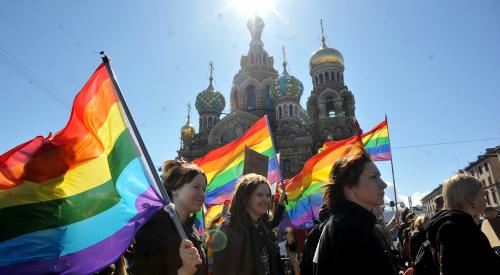- About
- Topics
- Picks
- Audio
- Story
- In-Depth
- Opinion
- News
- Donate
- Signup for our newsletterOur Editors' Best Picks.Send
Read, Debate: Engage.
| April 23, 2019 | |
|---|---|
| topic: | Good Governance |
| tags: | #Russia, #demographic, #Rosstat, #Vladimir Putin |
| located: | Russia |
| by: | Igor Serebryany |
The recent report published by the Russian federal statistics agency Rosstat suggests that even if Vladimir Putin stays in power for another 200 years (which he, definitely, would be happy to do), he will have no subjects to rule by that time.
The mathematical models give no room for manoeuvre: if the current rate of depopulation continues, no people we now know as Russian will remain here in a mere five generations (someone's great-great-grandson or -daughter will inevitably become the last of Mohicans).
Economy minister Maxim Oreshkin considers the demographic situation in Russia as “one of the world’s gravest”. According to him, Russia has been losing 800,000 people annually, due to a steady decline in birth rate. In 2017 alone, it dropped by 10.7%.
There’s no magic tool to reverse that decline, says director of the Moscow’s Demography Institute Alexander Vishnevsky.
“Russians don’t bear children due to the factors beyond their will. The country simply lacks enough women at reproductive age. So whatever the state undertakes, the situation will remain dire,” he foresees.
By 2025, he calculates, the number of Russian women in their childbearing age will drop by another 28% compared to 2019.
However, all those programs fail to address the basic question: why should Russian men and women want to have children in a withering country which offers their descendants no light at the end of the tunnel?
The Kremlin once saw the ethnic Slavic residents of the former Soviet republics as Russia’s natural pool to replenish its declining population. It looked like a healthy idea: with 25 million Russian speakers spread across 14 neighbouring countries, the “Resettlement of the fellow countrymen” program launched in the early 2000s promised a bright future.
However, the rush was short-lived, its impact slim. The resettlement lost steam even before the first million of the fellow countrymen set their feet on the motherland's soil.
“In the entire world now there are simply not enough Russian speakers who would like to move to Russia and so reverse its demographic trend. I personally know many families in Kazakhstan who at some period in their lives were about to make that move but abandoned it eventually due to numerous bureaucratic red tapes and the economic infeasibility of such resettlement,” says director of the Moscow’s Institute of Regional Problems, Dmitry Zhuravlev.
Facing the “Russian World” reluctance to be embraced by its own historical motherland, the Kremlin is trying to open doors for everyone regardless of their ethnicity, mother tongue, citizenship, marital status and other formal criteria.
The “Russia for everyone” policy has been a desperate attempt to populate the country, inflate its workforce (and so the taxation base), the experts note.
The government took it for granted that impoverished residents of Central Asia and Africa would flood Russia in millions, work hard, learn the language, marry locals and so become faithful citizens in one generation.
The same model works more or less smoothly in Canada or the United States, to name a few. Why should Russia be different, the architects of the open doors policy thought.
Once again, during the first decade after its launch, the policy seemed to work well. Russian cities have soon become filled with the “visible minorities”, making Moscow streets indistinguishable from those in Berlin, London or Toronto.
According to Rosstat, in 2017 alone, the migrants from three Central Asian countries - Uzbekistan, Tajikistan, Kyrgyzstan - transferred to their home countries over $9.5 bln earned at the Russian construction sites, gas stations, farms and other industries where the local residents have been too proud to work.
So the recent report by the Rosstat came out of the blue. In 2018, it states, guest workers outflow outpaced their inflow four-times (the number of the first-time migrants rose 4% year-on-year, while the number of guest workers left Russia for good jumped by 16.9%).
In 2018, the migrants replenished the drop of population in Russia by 57.2% only. The last year, the number of Uzbek nationals, once the biggest group among the migrant community in Russia, dropped by a whopping 70%. The number of Ukrainian passport holders (but ethnically and culturally Russian people) whose influx to Russia peaked in 2014-2105, dropped even sharper, by 74%.
The reason why the foreign nationals vote with their feet has been clear and simple, says a professor in the Russian Economy and State Management Academy Alexander Shcherbakov.
“There are few people who move to Russia for any other reason but job opportunities. So the outflow of the guest workers is a highly precise indicator of the state of affairs in the Russian economy. They have been immune to Kremlin propaganda and are able to soberly estimate Russia’s chances for recovery, ” he says.
By copying the embed code below, you agree to adhere to our republishing guidelines.
